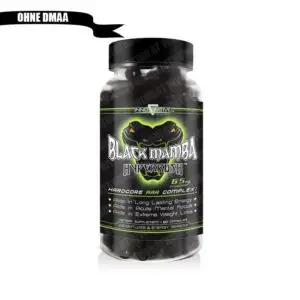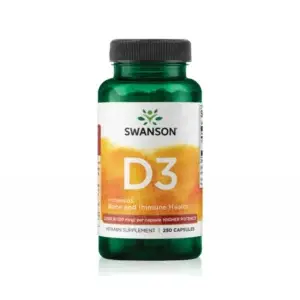- Supplements
- Fat Burners
- Pre Workout Booster
- Testo Booster
- Ephedrine HCL
- ECA stack
- Yohimbine
- Prohormones
- SARMs
- Power
- Muscle
- Accessories
- Fat loss
- Diet
- Health
- Endurance
-
50€+ Order = Free Shipping
*AT & DE
Manufacturers
BESTSELLER








About
FATBURNERKING


Vitamin D is actually a hormone that the body obtains mainly through the synthesis of sunlight. It not only supports bone health, but also plays a crucial role in metabolism and immune defense.
Vitamin D is more than just a simple vitamin - it is an important building block for our health. As a fat-soluble group of vitamins known as calciferols, it plays a central role in bone metabolism and is crucial for the health of our bones. There are two main forms of vitamin D, ergocalciferol (vitamin D2) and cholecalciferol (vitamin D3). The body can largely produce vitamin D3 itself through exposure to sunlight, but it can also be obtained from certain foods. In addition to its well-known importance for bones, vitamin D3 also has a positive effect on muscle metabolism and the immune system.
























Sunlight is the most effective way to meet the daily requirement of vitamin D3, as 80 to 90 percent is produced in the body through exposure to sunlight on the skin. Despite the possibility of obtaining vitamin D from food, sun exposure remains the main source. To ensure sufficient synthesis, it is recommended to go out in the sun for short periods without sun protection two to three times a week between March and October. However, in the winter months, especially in northern regions, the lack of sunlight can lead to vitamin D deficiency. People with darker skin tones, which contain more melanin, may have a lower ability to synthesize vitamin D from sunlight, increasing their risk of deficiency.
Interestingly, it is converted in the body into the biologically active hormone calcitriol, which is deeply involved in various metabolic processes. This hormone is essential for the regulation of calcium and phosphate metabolism, making it a key contributor to bone mineralization. In addition to its role in bone health, vitamin D3 is associated with supporting muscle strength and directly influences muscle metabolism. Sufficient exposure to sunlight plays a decisive role in this hormone-active function of the vitamin, as this is the only way to stimulate the necessary vitamin D synthesis in the body. Vitamin D, as a precursor to calcitriol, is therefore essential for a number of vital bodily functions.
Vitamin D, often referred to as the "sun vitamin", plays a central role in the human body. It is essential for the regulation of calcium and phosphate metabolism, which directly influences bone health. But its functions go far beyond bone metabolism. Vitamin D3 is either absorbed through food or synthesized on the skin through sunlight. It plays an important role in the immune system and in cell division, ensuring that these systems work effectively. Especially for older adults and people with limited sun exposure, an adequate intake of vitamin D is essential to avoid deficiency symptoms.
When taking vitamin D3, it is important to also take vitamin K2. This allows the released enzymes to carry the calcium into the bones (K2).
The importance of vitamin D3 for bone health cannot be overemphasized. A deficiency leads to decalcification and softening of the bones, which increases the risk of rickets, especially in children. Vitamin D contributes significantly to the stability of bones and the maintenance of healthy teeth. For people taking medication such as glucocorticoids, taking vitamin D supplements can help maintain bone health. In addition, vitamin D tests are a helpful method of monitoring vitamin D levels in the body and detecting possible deficiencies at an early stage, especially in older people or those with low sun exposure.
Vitamin D3 has an immunomodulating effect and is crucial for a strong immune system. It supports the activation and division of T lymphocytes, which play a central role in the defense against infections. Sufficient vitamin D levels can protect against respiratory infections by influencing metabolic processes in various organs and tissues.
Vitamin D3 is essential for calcium and phosphate metabolism, which in turn supports the mineralization of bones and the absorption of calcium and phosphorus in the intestine. However, its role is not limited to ensuring bone density. Vitamin D3 also influences muscle strength and is involved in many other metabolic processes in the body. In the liver and kidneys, vitamin D3 is converted into its active forms, which are essential for a variety of hormonal and metabolic activities. As a result, vitamin D contributes to both general health and specific functions in the body.
Vitamin D3 not only affects the bones, but is also important for muscle function. It intervenes in numerous metabolic processes that influence muscle strength. A sufficient supply ensures that normal muscle function is maintained. The body mainly produces vitamin D through exposure to sunlight on the skin, which supports muscle health and strength. As vitamin D3 is fat-soluble, it can be stored in fat and muscle tissue, which ensures its long-term effect on muscle function. If the body is not sufficiently supplied, this can negatively affect muscle strength and increase the risk of falls and injuries.
























Vitamin D3 is an essential nutrient that supports many important functions in the body, especially bone health. Vitamin D deficiency can have serious health consequences, ranging from general fatigue to more serious illnesses. People of all ages can be affected, especially if their ability to synthesize vitamin D is limited by lack of sun exposure or health problems.
A vitamin D3 deficiency can manifest itself through a number of non-specific symptoms that are often confused with other health problems. These include muscle weakness and an increased susceptibility to infections, which can have a significant impact on everyday life. Many sufferers complain of chronic fatigue and even hair loss. Circulatory weakness and concentration problems are also frequently observed symptoms. In more severe cases, the deficiency can lead to longer-lasting problems such as dizziness and headaches. Without treatment, the condition can worsen and lead to diseases such as rickets in children and osteomalacia in adults, which can have a serious impact on quality of life.
Vitamin D3 is crucial for our health, especially when it comes to strong bones. It ensures the absorption of calcium and phosphate in the intestine and thus contributes to the mineralization of bones. Although we can get vitamin D from the sun, diet also plays an important role - even if it only makes up a small part of our overall vitamin D supply. Especially in the winter months, it can be difficult to get enough sunlight, which is why we should take a closer look at our eating habits.
If you're wondering what foods you can include in your diet to meet your vitamin D3 needs, you may be surprised to learn that there aren't too many options. Rich cod liver oil is one of the best natural sources and provides impressive amounts of vitamin D. Oily fish such as salmon, eel and mackerel also score highly with notable amounts. Salmon contains around 16 µg per 100 g, while eel contains as much as 21 µg. But fish is not the only option; edible mushrooms such as button mushrooms also provide vitamin D, albeit in lower doses. And then there are chicken eggs and fortified margarine as other sources that can supplement a balanced diet.
In winter, our body usually reaches its limits when it comes to vitamin D production. The low intensity of sunlight at this time of year, especially in more northern regions, means that we are heavily reliant on stored vitamin D3 reserves. Adequate vitamin D3 intake is important to prevent symptoms of deficiency such as weakened bone stability or a weakened immune system. It is particularly important for infants; they need the vitamin regularly to prevent rickets, regardless of the time of year. A smart plan is to indulge in your favorite winter sport and take a walk in the daylight at the same time - that way you stay fit and have the chance of a little sunshine.
Vitamin D3 is great for our health, but too much of a good thing can also be dangerous. An overdose of vitamin D causes the body to store excess vitamin as it cannot be easily excreted. This can lead to serious health problems that we should not ignore. A high blood calcium level resulting from a vitamin D3 overdose can cause symptoms such as nausea and vomiting. In worse cases, kidney failure or even a fatal outcome can occur.
The symptoms of a vitamin D3 overdose are varied and range from mild to severe. Hypervitaminosis D, i.e. rare intoxication, usually occurs due to excessive intake through dietary supplements. The most common symptoms include nausea, vomiting, diarrhea, headaches and dizziness. In more severe cases, joint and muscle pain can occur and there is a risk of more complex symptoms such as pancreatitis and cardiac arrhythmia.
Excessive calcium levels in the blood can also lead to serious kidney damage and increase the risk of inflammation of the membranes of the brain or spinal cord. It is therefore extremely important not to exceed the recommended daily dose of vitamin D3. So let's stay alert and pay attention to the symptoms.
Although it is important to avoid vitamin D deficiency, long-term overdoses also have their risks. On the positive side, it has been found that an adequate supply of vitamin D can reduce the risk of diseases such as respiratory infections and cancer. It supports the immune system and can reduce chronic inflammation.
It is essential to take vitamin D3 in the correct dosage to avoid health complications. A daily intake of more than 20,000 IU could lead to a dangerously high concentration in the body, with unpleasant effects such as kidney stones or kidney calcification. According to the Federal Institute for Risk Assessment, the recommended maximum amount of vitamin D3 is 20 micrograms per day.
Vitamin D3 preparations with higher dosages are considered to be medicines and no longer food supplements and should only be taken under medical supervision. High-dose preparations containing 10,000 or 20,000 IU per week are only intended for medical reasons. So let's make sure we take vitamin D3 at the correct dose to get the best possible health benefits.
Vitamin D3 is an essential vitamin that our body synthesizes mainly through sunlight. Between March and October, it is recommended to expose uncovered parts of the body such as the face, hands and arms to the sun two to three times a week to optimize vitamin D status. But what if the sun is not enough? Food supplements are therefore a sensible option, especially if your own synthesis and diet are not sufficient. However, caution is advised: An overdose can have undesirable effects, such as cardiac arrhythmia and kidney stones. The vitamin D status in the blood is determined by 25-hydroxyvitamin D (25(OH)D). A standardized measurement ensures the necessary comparability. In addition, certain medications can impair the effect, so it is advisable to consult a doctor before taking any preparations.
Anyone who is concerned about a possible vitamin D deficiency should seek medical advice. A deficiency diagnosed by a doctor requires targeted treatment and monitoring. People who are taking medication should discuss the use of vitamin D supplements with their doctor, as certain medications can impair the effect of vitamin D. During pregnancy, vitamin D supplements should only be taken if there is a proven deficiency and calcium levels should be monitored. People with a tendency to kidney stones or diseases such as sarcoidosis should carefully consider taking them. All decisions on vitamin D supplementation should be based on sound scientific evidence and medical advice.
Vitamin D is a real all-rounder among the vitamins. Not only does it play a crucial role in our bone health, but it also has significant effects on our immune system and general well-being. As the production of vitamin D is heavily dependent on our exposure to the sun, it is important to make sure we spend enough time outdoors, especially in the months with fewer hours of sunshine. If necessary, taking vitamin D supplements can help to cover the daily requirement, especially if geographical or climatic conditions make natural synthesis difficult. Overall, it is advisable to have your personal vitamin D status checked regularly to avoid both deficiency symptoms and overdoses.
© copyright 2018-2025 Fatburnerking.at
| Cookie | Duration | Description |
|---|---|---|
| cookielawinfo-checkbox-advertisement | 1 year | This cookie is set by the GDPR Cookie Consent Plugin and is used to record the user's consent for the cookies in the "Advertising" category. |
| cookielawinfo-checkbox-analytics | 11 months | This cookie is set by GDPR Cookie. The cookie is used to store user consent for cookies in the "Analytics" category. |
| cookielawinfo-checkbox-functional | 11 months | The cookie is set based on the consent of the GDPR cookies to record the user's consent for cookies in the "Functional" category. |
| cookielawinfo-checkbox-necessary | 11 months | This cookie is set by GDPR Cookie. Cookies are used to store the user's consent to the storage of cookies in the "Necessary" category. |
| cookielawinfo-checkbox-others | 11 months | This cookie is set by GDPR Cookie. The cookie is used to store the user's consent for cookies in the "Other" category. |
| cookielawinfo-checkbox-performance | 11 months | This cookie is set by GDPR Cookie. The cookie is used to store user consent for cookies in the "Performance" category. |
| CookieLawInfoConsent | 1 year | Records the default button status of the corresponding category and the status of CCPA. It only works in coordination with the primary cookie. |
| elementor | never | This cookie is used by the website's WordPress theme. It allows the website owner to implement or change the content of the website in real time. |
| viewed_cookie_policy | 11 months | The cookie is set by the GDPR cookie and is used to store whether the user has consented to the use of cookies or not. It does not store any personal data. |
| Cookie | Duration | Description |
|---|---|---|
| ssupp.vid | 6 months | Cookie set by Smartsupp to record the visitor ID. |
| ssupp.visits | 6 months | Cookie set by Smartsupp to record the number of previous visits, necessary to track automatic messages. |
| Cookie | Duration | Description |
|---|---|---|
| _ga | 2 years | The _ga cookie installed by Google Analytics calculates visitor, session and campaign data and also tracks website usage for the website analytics report. The cookie stores information anonymously and assigns a randomly generated number to identify unique visitors. |
| _gat_gtag_UA_179465762_1 | 1 minute | Set by Google to distinguish users. |
| _gid | 1 day | The _gid cookie installed by Google Analytics stores information about how visitors use a website and at the same time creates an analytics report about the website's performance. Some of the data collected includes the number of visitors, their source and the pages they visit anonymously. |
| tk_ai | 5 years | JetPack sets this cookie to store a randomly generated anonymous ID that is only used in the administration area and for general analytics tracking. |
| tk_lr | 1 year | The tk_lr is a referral cookie set by the JetPack plug-in on websites using WooCommerce that analyses referral behaviour for Jetpack. |
| tk_or | 5 years | The tk_or is a referral cookie set by the JetPack plug-in on websites using WooCommerce that analyses referral behaviour for Jetpack. |
| tk_qs | 30 minutes | JetPack sets this cookie to store a randomly generated anonymous ID that is only used in the administration area and for general analytics tracking. |
| tk_r3d | 3 days | JetPack installs this cookie to collect internal metrics for user activity to improve the user experience. |
| tk_tc | Session | JetPack sets this cookie to record details of how users use the website. |
| Cookie | Duration | Description |
|---|---|---|
| _fbp | 3 months | This cookie is set by Facebook to display ads after visiting the website, either on Facebook or on a digital platform powered by Facebook Ads. |
| fr | 3 months | Facebook sets this cookie to display relevant ads to users by tracking user behaviour on the web, on websites with Facebook Pixel or Facebook Social Plug-in. |
| Cookie | Duration | Description |
|---|---|---|
| cookies.js | Session | No description available. |
| weglot_wp_rocket_cache | Session | No description |